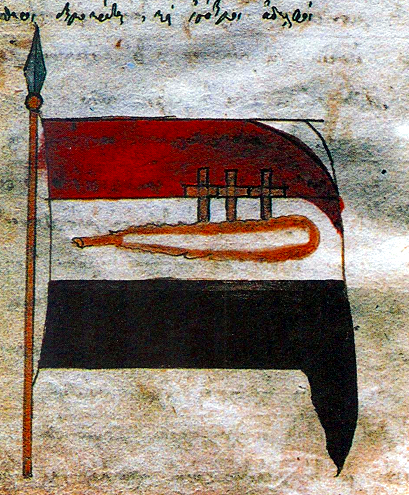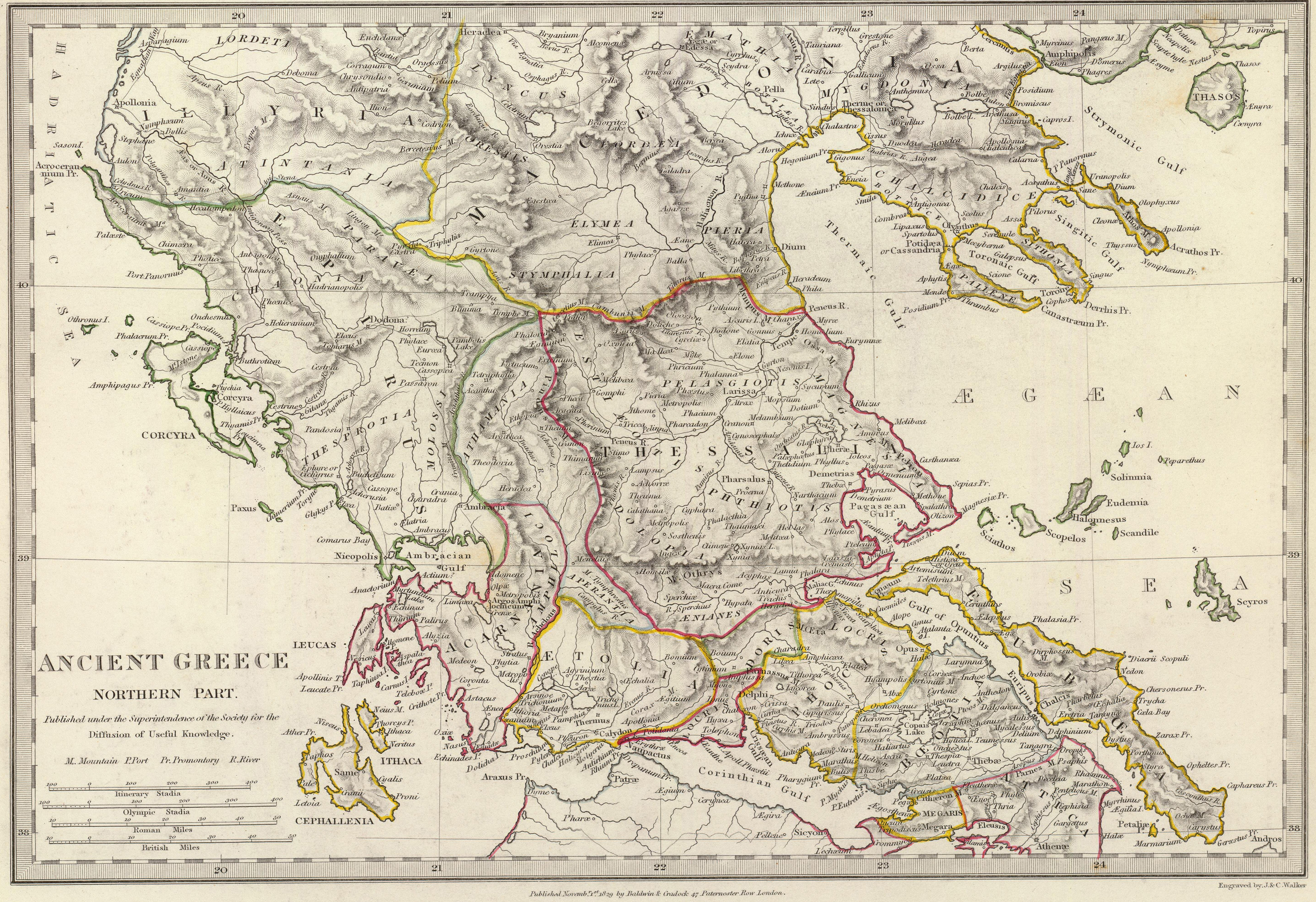|
Christoforos Perraivos
Christoforos Perraivos ( el, Χριστόφορος Περραιβός) was a Greek officer of the Greek War of Independence, member of the Filiki Eteria and author. In non-Greek sources his name is usually found as ''Per(r)evo(s).'' Biography Perraivos was born on 3 April 1773 in the village of Palioi Poroi, Pieria. His family name was Hatzivasiliou (Χατζηβασιλείου), but adopted the nickname “Perraivos” alluding to the Perrhaebi, an ancient Greek tribe of Thessaly. It is believed that he was an illegitimate son of a certain monk Hieronymos, an official at the Metropolis of Larissa. In 1793, with the help of the said Hieronymos, he left Greece to study at the Greek School in Bucharest and in 1796 to study medicine in Vienna. There he met the Greek humanist and revolutionary Rigas Feraios and entered an underground revolutionary organization. In 1797 Perraivos was arrested with Rigas and others by the Austrian authorities in Trieste but, unlike Rigas Feraios w ... [...More Info...] [...Related Items...] OR: [Wikipedia] [Google] [Baidu] |
Greek War Of Independence
The Greek War of Independence, also known as the Greek Revolution or the Greek Revolution of 1821, was a successful war of independence by Greek revolutionaries against the Ottoman Empire between 1821 and 1829. The Greeks were later assisted by the British Empire, Bourbon Restoration in France, Kingdom of France, and the Russian Empire, while the Ottomans were aided by their North African vassals, particularly the eyalet of Egypt Eyalet, Egypt. The war led to the formation of modern Greece. The revolution is Celebration of the Greek Revolution, celebrated by Greeks around the world as Greek Independence Day, independence day on 25 March. Greece, with the exception of the Ionian Islands, came under Ottoman rule in the 15th century, in the decades before and after the fall of Constantinople. During the following centuries, there were sporadic but unsuccessful Ottoman Greece#Uprisings before 1821, Greek uprisings against Ottoman rule. In 1814, a secret organization called Filiki Et ... [...More Info...] [...Related Items...] OR: [Wikipedia] [Google] [Baidu] |
Greek Revolution Flag
Greek may refer to: Greece Anything of, from, or related to Greece, a country in Southern Europe: *Greeks, an ethnic group. *Greek language, a branch of the Indo-European language family. **Proto-Greek language, the assumed last common ancestor of all known varieties of Greek. **Mycenaean Greek, most ancient attested form of the language (16th to 11th centuries BC). **Ancient Greek, forms of the language used c. 1000–330 BC. **Koine Greek, common form of Greek spoken and written during Classical antiquity. **Medieval Greek or Byzantine Language, language used between the Middle Ages and the Ottoman conquest of Constantinople. **Modern Greek, varieties spoken in the modern era (from 1453 AD). *Greek alphabet, script used to write the Greek language. *Greek Orthodox Church, several Churches of the Eastern Orthodox Church. *Ancient Greece, the ancient civilization before the end of Antiquity. *Old Greek, the language as spoken from Late Antiquity to around 1500 AD. Other uses * '' ... [...More Info...] [...Related Items...] OR: [Wikipedia] [Google] [Baidu] |
Eleftherios Benakis
Eleutherios or Lefteris ( el, Ελευθέριος, "the liberator") is an epithet and formal attribution in the Greek pantheon, including: *Dionysus *Eros *Zeus From Eleuther, son of Apollo and Aethusa. # He is renowned for having an excellent singing voice, which earned him a victory at the Pythian games, # and for having been the first to erect a statue of Dionysus. # as well as for having given his name to Eleutherae. # His sons were Iasius. # and Pierus. He also had several daughters, who spoke impiously of the image of Dionysus wearing a black aegis, and were driven mad by the god; as a remedy, Eleuther, in accordance with an oracle, established a cult of "Dionysus of the Black Aegis". # Eleuther, a variant of the name Eleutherios, early Greek god who was the son of Zeus and probably an alternate name of Dionysus. # Eleuther, one of the twenty sons of Lycaon. He and his brother Lebadus were the only not guilty of the abomination prepared for Zeus, and fled to Boeotia. # Eleut ... [...More Info...] [...Related Items...] OR: [Wikipedia] [Google] [Baidu] |
Siege Of Corfu (1798–99)
Siege of Corfu may refer to: * Siege of Corfu (1537) by the Ottoman Turks led by Hayreddin Barbarossa * Sieges of Corfu 1571 and 1573, see Corfu#Venetian rule and :Ottoman–Venetian War (1570–1573) * Siege of Corfu (1716) by the Ottoman Turks * Siege of Corfu (1798–1799) by a Russian-Turkish fleet led by admiral Fyodor Ushakov Fyodor Fyodorovich Ushakov ( rus, Фёдор Фёдорович Ушако́в, p=ʊʂɐˈkof; – ) was an 18th century Russian naval commander and admiral. He is notable for winning every engagement he participated in as the Admiral of t ... See also * Corfu (other) {{Disambiguation ... [...More Info...] [...Related Items...] OR: [Wikipedia] [Google] [Baidu] |
Corcyre
Corcyre (, archaic French for "Corfu", ) was one of three short-lived French departments of Greece. It came into existence after Napoleon's conquest in 1797 of the Republic of Venice, when Venetian Greek possessions such as the Ionian islands fell to the French Directory. It consisted of the islands of Kerkyra (Corfu) and Paxoi, as well as the cities of Butrint and Parga on the adjacent mainland. Its prefecture was in the City of Corfu. The island was lost to Russia after the Siege of Corfu (1798–1799) and the department was officially disbanded in 1802. Also, Butrint was captured in 1799 by Ali Pasha, governor of Yanya Eyalet.During the renewed French control in 1807–1814, the department was not re-established, the constitutional form of the former Septinsular Republic being kept. Administration Commissioners The Commissioner of the Directory was the highest state representative in the department. See also * Department of Mer-Égée * Department of Ithaque * French ... [...More Info...] [...Related Items...] OR: [Wikipedia] [Google] [Baidu] |
Corfu
Corfu (, ) or Kerkyra ( el, Κέρκυρα, Kérkyra, , ; ; la, Corcyra.) is a Greek island in the Ionian Sea, of the Ionian Islands, and, including its small satellite islands, forms the margin of the northwestern frontier of Greece. The island is part of the Corfu regional unit, and is administered by three municipalities with the islands of Othonoi, Ereikoussa, and Mathraki.https://corfutvnews.gr/diaspasi-deite-tin-tropologia/ The principal city of the island (pop. 32,095) is also named Corfu. Corfu is home to the Ionian University. The island is bound up with the history of Greece from the beginnings of Greek mythology, and is marked by numerous battles and conquests. Ancient Korkyra took part in the Battle of Sybota which was a catalyst for the Peloponnesian War, and, according to Thucydides, the largest naval battle between Greek city states until that time. Thucydides also reports that Korkyra was one of the three great naval powers of fifth century BC Greece, alo ... [...More Info...] [...Related Items...] OR: [Wikipedia] [Google] [Baidu] |
Rigas Feraios
Rigas Feraios ( el, Ρήγας Φεραίος , sometimes ''Rhegas Pheraeos''; rup, Riga Fereu) or Velestinlis (Βελεστινλής , also transliterated ''Velestinles''); 1757 – 24 June 1798), born as Antonios Rigas Velestinlis ( el, Αντώνιος Ρήγας Βελεστινλής), was a Greek writer, political thinker and revolutionary, active in the Modern Greek Enlightenment. A victim of the Balkan uprising against the Ottoman Empire and a pioneer of the Greek War of Independence, Rigas Feraios is today remembered as a national hero in Greece. Early life Rigas Feraios was born in 1757 as Antonios Rigas Velestinlis into a wealthy family in the village of Velestino in the Sanjak of Tirhala, Ottoman Empire (modern Thessaly, Greece). He later was at some point nicknamed ''Pheraeos'' or ''Feraios'', by scholars, after the nearby ancient Greek city of Pherae, but he does not seem ever to have used this name himself; he is also sometimes known as ''Konstantinos'' or ... [...More Info...] [...Related Items...] OR: [Wikipedia] [Google] [Baidu] |
Metropolis Of Larissa
The Metropolis of Larissa and Tyrnavos ( el, Ιερά Μητρόπολις Λαρίσης και Τυρνάβου) is a Greek Orthodox metropolitan see in Thessaly, Greece. History Christianity penetrated early to Larissa, though its first bishop is recorded only in 325 at the Council of Nicaea. Saint Achillius of Larissa, of the 4th century, is celebrated for numerous miracles. Michel Le Quien cites twenty-nine bishops from the 4th to the 18th centuries. In the Ecumenical Council of Ephesus in 431, the Bishop of Larissa is already mentioned as metropolitan bishop of Thessaly, and some of his suffragans who participated in the council were the bishops of Pharsalus, Lamia, Thessalian Thebes, Echinos, Hypate (Ypati), Kaisareia, and Demetrias. Some time between 730 and 751, the Church in Thessaly, along with the rest of the Illyricum, were transferred from the jurisdiction of the Pope in Rome to that of the Patriarch of Constantinople. Bishop Vigilantius attended the Council of ... [...More Info...] [...Related Items...] OR: [Wikipedia] [Google] [Baidu] |
Perrhaebi
The Perrhaebi () were an ancient Greek people who lived on the western slopes of Olympus, on the border between Thessaly and Macedonia. They took part in the Trojan War under Guneus and also fought in the Battle of Thermopylae. History Still independent at the time of the ''Iliad'', they were tributary ''períoikoi'' to the neighbouring Thessali in the 5th century BC, with a special dependence upon the city of Larisa. They could, however, enjoy some degree of autonomy whenever the Thessalian League was weaker, and they had retained from their independence two votes in the Delphic Amphictyonic League (''Amphiktyonía''), until Philip II of Macedon took one vote from them. They were part of the Macedonian Kingdom until the Roman conquest by Titus Quinctius Flamininus in 196 BC. They were listed in Xerxes' vast army by Herodotus. A coin of the Perrhaebi depicted a man restraining a bull on one side and a horse on the other. The inscription was "Περραιβών".Handbook of ... [...More Info...] [...Related Items...] OR: [Wikipedia] [Google] [Baidu] |
Pieria (regional Unit)
Pieria ( el, Πιερία) is one of the regional units of Greece located in the southern part of the Region of Central Macedonia, within the historical province of Macedonia. Its capital is the town of Katerini.The name Pieria originates from the ancient Pieres tribe. In Pieria, there are many sites of archeological interest, such as Dion, Pydna, Leivithra and Platamonas. Pieria contains Mount Pierus, from which Hermes takes flight in order to visit Calypso, and is the home of Orpheus, the Muses, and contains the Pierian Spring. Mount Olympus, the highest mountain in Greece and throne of the ancient Greek gods, is located in the southern part of Pieria. Other ancient cities included Leibethra and Pimpleia. Geography The Pieria regional unit is bordered by Imathia to the north, Kozani to the west, and to the south and west by the region of Thessaly's regional unit Larissa. The Pierian Mountains lie to the west; the Thermaic Gulf lies to the east. It also has a valley by ... [...More Info...] [...Related Items...] OR: [Wikipedia] [Google] [Baidu] |


